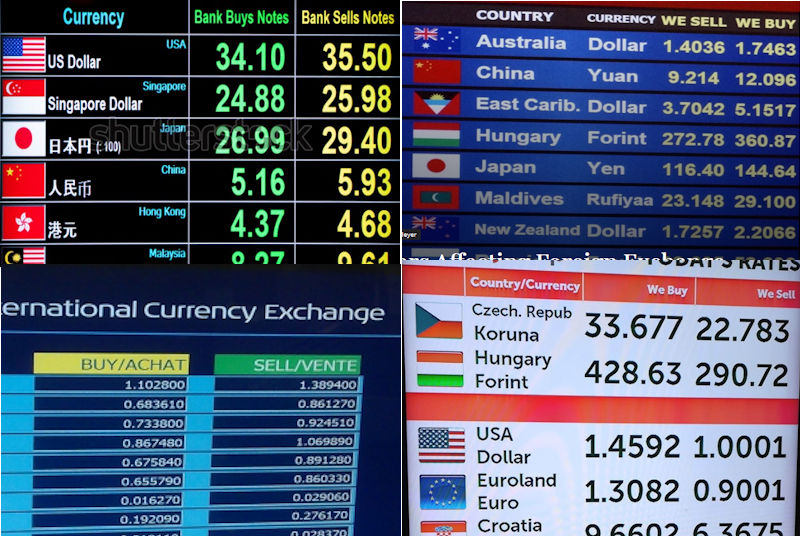Ten Tips To Help Learn About The Differences In Exchange Rates
Anyone involved in international travel and finance, business, or managing investment across borders will need to understand exchange rate margins. The exchange rate margins are the differences in prices of buying and selling currencies. They can significantly impact the price of transactions. The margins for exchange rates vary widely between service providers, and could influence the amount you pay when you exchange currency, or how much you can earn from investing. If you are aware of the subtleties of exchange rate margins, you can make more informed decisions that save you money and improve your financial outcomes. These are the most detailed tips for managing exchange rate margins.
1. Find out What is the Exchange Rate Margin is.
The margin of exchange, also known as the spread, refers to the difference between the prices that currencies can be bought (ask) and sold (bid). This concept is crucial for investors, travelers, and businesses because it affects the amount you pay when you exchange currencies. A wider spread is a better rate of exchange, which will allow you to make more informed financial decision-making.
2. Compare Margins across Providers
Different financial institutions have different margins for exchange rates. Before you make a currency exchange, compare the exchange rates of multiple providers. These include banks as well as kiosks, online platforms and banks. Websites like XE.com and OANDA offer real-time margins & rates, which allows you to make the right choice for your exchange.
3. Understanding Market Influences on Margin
Margins for exchange rates can be influenced by a myriad of factors, including market volatility, economic indicators, and geopolitical issues. A political or economic crisis instability could cause the margins to widen because of an increase of risk. By staying informed of these market trends, you will be able to be aware of changes in rates and take a timely decision regarding currency transactions.
4. Exchange your currency online
– Online platforms for currency exchange typically offer more competitive rates for exchange and smaller margins when compared to traditional banks as well as physical exchange services. Wise, previously TransferWise and Revolut offer real-time exchange rates and lower charges. Reduce costs by utilizing these platforms when you have to exchange currency for business and travel.
5. Timing Your Currency Exchange
The time that you change your currency can affect the margins you encounter. Exchange rates change throughout the day depending on the market demand and supply. Monitoring these fluctuations could assist you in finding the best rates for exchange, and may increase your margins. These decisions can be made easier by using tools that track the trends in currency.
6. Currency Hedging Strategies Using Leverage
Strategies for currency hedging are a good option for business and investors to control their margins on exchange rates. Hedging involves the use of financial tools that lock in the future exchange rate and protect against adverse fluctuations in the currency. This method can be employed to limit the effects and improve the profit margins of companies that engage in international trading.
7. Keep an eye on Economic Indicators
Diverse economic indicators such as inflation, interest rates, and employment are able to influence exchange rates and margins. For example an increase in interest rates may attract foreign investment and strengthen its currency, reducing the exchange rate. These indicators will help you gain an understanding of the movements of currencies. This can allow you to alter your strategies.
8. Be aware of the local currency when Traveling
– Always choose to make your purchases in local currency, not your own. You will avoid having to pay for an exchange rate that is dynamic (DCC), which often comes with unfavorable rates of exchange. Paying with local currency generally provides a more favorable exchange rate which reduces the total cost of your purchases abroad.
9. Be aware of hidden charges
– In addition to exchange rate margins, be aware of hidden charges paid by the currency exchange service. They could include transaction charges as well as service fees and commissions, which could increase the margin you get. To avoid any unanticipated charges be sure to read the fine print before completing a currency exchange.
10. Consult financial professionals to handle large transactions
Consultations with financial or currency experts are helpful when dealing with large sums of money or intricate exchange rates. They can help you understand the rate of exchange margins and provide strategies to cut costs. Their knowledge is especially useful for businesses or investors looking to maximize their currency holdings.
Follow these tips to better navigate transactions in currencies, whether you are traveling in business, conducting business or managing investments. If you know how to manage exchange rate margins, you will be able to make more informed financial decisions in line with your financial goals. You will save money and improve your financial strategies. Follow the top exchange rate for more info including convert euro to usd, dollar to php peso, convert pounds to dollars, dinar guru, us dollar to pakistani rupee, gpb to usd, pound to usd, usd jpy, yen to usd, usd to indian rupees and more.

Top 10 Guidelines To Regulate Currency Exchange Rates And Other Governmental Issues
Navigating regulatory considerations is essential for those who travel or conducting business internationally, or managing investments. Regulations vary widely between countries. They may affect anything from currency exchange rates tax rates, customs charges, to trade compliance, investment restrictions, and much more. Understanding these regulations is crucial to ensuring compliance and avoiding penalties. When you're familiar with the regulations, you'll be able to make educated decisions that will enhance your experience of travel, simplify operations in your company and safeguard your investments. The top 10 tips are provided below for you to handle your regulatory concerns in financial business.
1. Research Visa and Entry Requirements
When you travel to a foreign country, do your research on the requirements for entry and visas. Entry permits, visas, and residency requirements differ between countries. Be sure to have all the required documents to avoid problems at immigration. Additionally, you must be informed about recent changes to regulations that could affect your ability and desire to travel. This is due to the fact that many nations have revised their rules in response to global events.
2. Learn about Customs Regulations
Be aware of the import and export restrictions of the nation you intend to travel to. Each country has its own rules for what items can be brought in free of duty or tax. If you violate these rules, it could result in fines or confiscation. Be aware that a lot of countries require you to declare cash in excess of an amount.
3. Foreign Currency Regulations: Be aware
Different countries have different regulations concerning currency exchanges and international transfers. Do you wish to understand the rules and regulations governing currency exchange in the country you'll be doing business? could be limitations to the amount that you can be exchanged or transferred. Understanding these regulations will help you avoid penalties and ensure the compliance of local laws.
4. Consult with Local Legal Experts
Talk to local experts to get a better understanding of the regulatory environment. They can provide invaluable insights into local laws as well as compliance requirements and the potential risks that could arise from your business activities. This advice can help you navigate complex regulations and avoid costly mistakes.
5. Find out more about tax obligations
Tax regulations differ greatly across countries which can have a significant impact on the business or individual. You must research the taxes you'll be liable to while traveling overseas or conducting business, such as tax on income, VAT and withholding taxes on payments. Also, keep track of any tax treaties that exist between your country of origin and the destination country which may impact your tax liabilities.
6. Trade Regulations
– If your business involves the export or import of products, make sure you meet the requirements of trade regulations which include tariffs, import quotas as well as licensing requirements. If you do not adhere to these regulations, it can lead to fines and delays in the delivery of products. Consult an expert on trade compliance to get advice regarding the specific regulations that apply to your product and you.
7. Keep an eye on changes to regulatory environments.
Social, economic, or political influences can cause the regulatory environment to shift rapidly. Subscribe to relevant information, news and updates on regulatory issues. You'll be aware of any possible changes that might affect your travels, business or investments. This proactive approach helps to ensure compliance and adjust to any new regulations.
8. Investment Regulations – What you must be aware of
– For investors, understanding the regulatory framework in countries where you plan to invest is vital. Foreign investment is subject to different regulations in various regions. These regulations can include ownership restrictions and reporting requirements as well as regulation of investment vehicles. It is recommended to research these rules carefully to ensure your investment is in line with local laws and avoid possible penalties.
9. Compliance Software and Tools
Consider using software and tools that can help both businesses and individuals to comply with regulations. These platforms assist with the management of documents, tracking regulatory updates and ensuring compliance with industry. Implementing tools for compliance can simplify and decrease the chance of non-compliance.
10. Local Business Networks: Engage in Local Business Networks
– Networking with local businesses and other organizations can offer important insights into regulatory issues. Joining chambers of business, trade associations or industry associations in your local area can assist you connect with experts who are familiar with the regulatory environment. These contacts could provide practical tips on how you can comply with local laws.
With these helpful suggestions on regulatory issues to help you navigate the maze of travel or conducting business and analyzing investments more effectively. Understanding the regulatory framework can help you make well-informed decisions that align with your goals, ultimately improving your overall experience and your financial strategy. Understanding the regulatory landscape can help you to avoid potential pitfalls when you travel overseas to enjoy a vacation or to expand your business abroad or investing across borders. Take a look at the best eur huf blog for blog advice including php to usd, us dollar to pkr, usd to pound sterling, usd to thb, currency exchange, usd to indian rupees, cad to usd, usd to pakistani rupee, dollar to mexican peso, usd to mexican peso and more.

